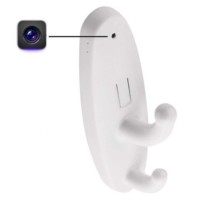A civil lawsuit against several large oil companies for allegedly failing to act when a female drill rig engineer discovered a spy cam in her room is one step closer to a jury trial… it is one expensive reason why corporations need to take unauthorized surveillance seriously- and have a professional TSCM sweep team on call.

Coat hook camera used for eavesdropping.
The camera was found embedded in a coat hook that had been placed on the engineer’s bedroom door on board the Deepwater Invictus, an off-shore oil rig. The spy camera disappeared then later was discovered in the cabin of the only other female on board the rig.
The person believed responsible for placing the camera has already been fired, but the Louisiana woman (identified only as Jane Doe) is suing three companies, Transocean Drilling, BHP Petrolium, and Schulmberger Technology, for damages in excess of one million dollars. [Lawsuit here]
Among charges against the companies noted in the suit are the following:
- failure to maintain, inspect, and/or repair the vessel’s equipment;
- failing to maintain and/or provide a safe work environment;
- failing to provide a secure room for Plaintiff;
- failing to maintain and/or provide a safe sleeping environment;
- failing to provide adequate training to its employees;
- failing to conduct adequate background checks into the crew of the DEEPWATER INVICTUS;
- failing to conduct an adequate investigation after the spy camera was discovered, which was a gross and willful violation of Defendants’ maintenance-and-cure obligations to Plaintiff;
- …
We find that many corporations schedule technical surveillance countermeasures (TSCM) sweeps of their boardrooms and senior executive’s offices, and rightly so, as that is where the highest value communication takes place. But they often neglect less secured areas, such as smaller departments or other lower valued areas. These locations, though, may have the higher probability of being the target of surveillance perpetrated by insiders, due to less security and the ease of access to the areas.
Of course, a company may not be expected to perform sweeps of every room in their buildings, but by having a working relationship with a TSCM professional, they will be able to have immediate response to incidents such as discovery of a recording device or hidden camera, as well receive prompt technical guidance on how to best respond if a full sweep is not available. For example, it may not be practical to send a sweep team immediately out to an oil rig, but it would only take a phone call to a TSCM professional to receive guidance on what to look for and how to at least perform a cursory inspection.
Corporations of all sizes need to take the threat of unauthorized surveillance seriously. Performing regular sweeps not only protects information and communications, but it could help to mitigate the effects of a lawsuit such as this.
More information on this incident can be found at Click2Houston. The lawsuit document can be found [here].
